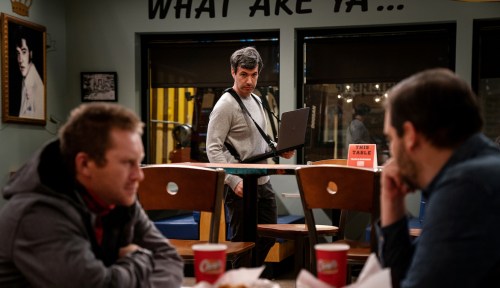While holding his fake son during episode three of The Rehearsal, comedian Nathan Fielder frets that there’s something missing from his social experiments, or “rehearsals.”
Experts in This Article
Assistant Professor of Psychiatry in the Perelman School of Medicine at the University of Pennsylvania, and Clinical Director of Penn’s Pediatric Anxiety Treatment Center at Hall Mercer (PATCH) program.
“There are several components to a good rehearsal,” Fielder says in a voiceover. “So far, my focus has been on practicing the actions and the words that you’re likely to encounter in your real life. But I’ve recently come to realize I’ve been neglecting one key component of every crucial life event: Feelings.”
The realization sounds like the reflections of a robot studying human interactions, one who is surprised to learn about the existence and unpredictable nature of emotion. That’s not something you can rehearse away. Or can you?
The Rehearsal is a new HBO show in which Fielder helps people practice for difficult moments or for making big decisions. It sounds straightforward, but his method is complete madness. Fielder and his crew duplicate the circumstances of that moment or decision to a degree of fidelity requiring a Game of Thrones-level budget. Take episode one, where the subject, Kor, wants to confess to a lie he told his friend. To prepare for that moment, the Rehearsal crew faithfully recreates the bar in which Kor will have that conversation down to the rips in the seat cushions. For another woman debating whether or not she wants to be a parent, Fielder hires a slate of child actors at different ages to pretend to be her child—and even tries to find her a pretend husband. In his efforts to help people feel prepared for these big moments, Fielder also makes decision trees for conversations, considers whether or not they should tell jokes, and even weighs the pros and cons of different seating choices. Every detail is rehearsed, except for the one that really matters: the unpredictable reality of having emotions in the moment.
The show is more unhinged than even the juiciest episode of Love Is Blind. But a facet of its painfully funny genius—beyond the squirmy awkwardness of watching Fielder interact with the people who actually agree to participate in these experiments—is that it turns social anxiety, or anticipation about interactions with other people, into absurdist comedy.
So perhaps it might not come as a shock that there is actually a method of therapy that does what Fielder aims to do—albeit with less chaos and more expert oversight.
The science of behavioral rehearsal therapy
Behavioral rehearsal (also known as behavior rehearsal) is a technique often used in combination with cognitive behavioral therapy to help people change or improve their social skills in a safe environment. This practice “refers to facilitated and structured practice of situations that may be difficult or stressful for an individual to do,” says Emily Becker-Haimes, PhD, an assistant professor of psychiatry in the Perelman School of Medicine at the University of Pennsylvania, who specializes in treating pediatric anxiety. “[Behavioral rehearsal] can be used to help people practice coping with strong feelings or practice using new skills in a controlled setting.”
That’s right: Nathan Fielder did not come up with the idea of rehearsing as a way to prepare for tough moments—he just took it to a preposterous degree.
But practicing both “actions and words,” as Fielder put it, is indeed a part of real behavioral rehearsal therapy. Dr. Becker-Haimes explains that a practitioner “might use behavioral rehearsals to [help a patient] practice staying calm in frustrating situations or demonstrate how changes in body language can alter the meaning of the words we say.” The scenarios practiced in a therapy session might cover whatever the social situation is that is causing distress, such as practicing for a job interview, or reaching out to a friend for help. In order to “rehearse,” a therapist might ask their patient to walk through a potential interaction by describing it verbally in therapy, or role-play with the therapist for more practice.
“Behavioral rehearsals can be applied in all sorts of ways to help people practice tolerating emotions or new skills,” Dr. Becker-Haimes says. Indeed, research has shown that the technique is effective in reducing social anxiety.
All the world’s a stage
Despite the fact that behavioral rehearsal is typically overseen by a trained and licensed therapist—not a comedian with a bunch of cameras creating a comedy series—some of the methods of the therapy do bear a resemblance to elements of the show. A therapist focusing on body language with a client, as Dr. Becker-Haimes mentioned earlier, recalls Fielder’s intensity on rehearsing interactions like he’s blocking a play. Practicing the actual words a patient will say, as a person might do in actual behavioral rehearsal, seems like less extreme version of the decision trees Fielder creates for his subjects’ conversations that he keeps pulled up on a laptop strapped to his chest.
A key difference is that the emphasis in behavioral rehearsal is not about controlling others and the outside world, but on managing and fortifying yourself. Meanwhile in The Rehearsal, Fielder’s attempt to minimize the variables you’ll encounter in the world misses the variable of “feelings”—in yourself and in other people—which is not actually something you can rehearse away. It’s something he starts to realize in episode four, when he notes that while working with actors training to be part of his rehearsal scenarios that there is a part of every person that is unknowable, even if you impersonate their actions.
“Part of what makes life both scary and wonderful is that there is a lot out of our control,” Dr. Becker-Haimes says. “While imagining feared scenarios and increasing our sense of self-efficacy for how we would handle difficult or scary situations can be a really valuable therapy technique, preparing for every possible outcome in life simply isn’t feasible.”
The Rehearsal puts on full display the bitter truth that we are at the whims of so many forces outside of our control. Fielder’s desire to achieve this control for his clients is so alien-ly misplaced, futile, and comic—which is the point. (Just watch him try and wrangle a bunch of babies in episode two and you’ll see what we mean.) But a lesson we all might take from behavioral rehearsal is that we are more in control than we might think. Not of the other people in our lives—that desire is impossible, misguided, and the fodder for absurdism. But we can honor and manage the feelings that will arise in tough situations, which is often what we’re really scared of, anyway. If only Fielder could live, and not just rehearse, that.
Sign Up for Our Daily Newsletter
Get all the latest in wellness, trends, food, fitness, beauty, and more delivered right to your inbox.
Got it, you've been added to our email list.











